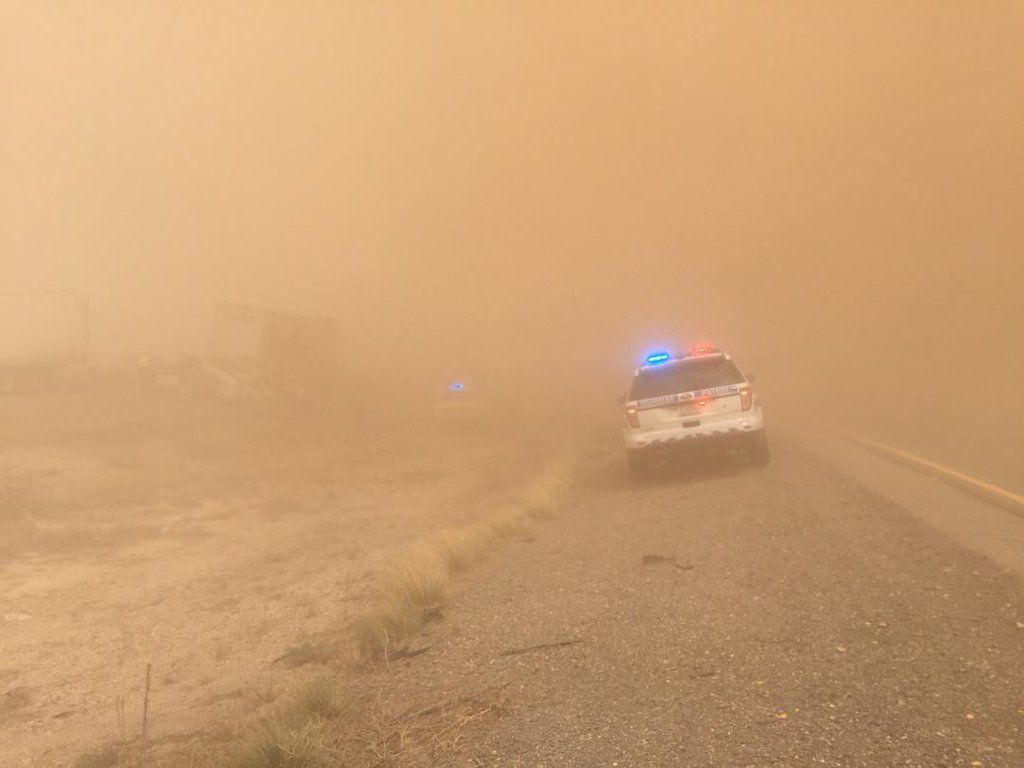Dust mitigation measures at a San Simon farm were insufficient to prevent a third day of Interstate 10 closures east of Tucson on Tuesday.
Driven by high winds, dust from David’s Agrigold Farms first closed I-10 on Sunday, a day after workers prepped 50 acres of land and removed soil stabilizer for planting, state inspectors said. The fields were left with “disturbed soil,” the report said.
“No water applications, tree planting or above-ground irrigation had occurred on this quadrant,” the report by Arizona Department of Environmental Quality inspectors said.
Winds created blowing dust Sunday through Tuesday that forced Arizona authorities to close a stretch of I-10 east of Tucson in both directions.
Cochise County emergency services coordinator Norman Sturm said the closures and detours “are not just an inconvenience,” and have significant financial consequences, along with the public safety impacts.
ADEQ officials said the farm had blowing dust issues last year, which cost the state an estimated $600,000 in efforts to stabilize the soil.
I-10 was first closed Sunday after dust caused three crashes, though it reopened by mid-afternoon. It was also closed for periods of time Monday and Tuesday.
In response to Sunday’s dust, Agrigold employees contracted two water trucks to wet down the 50-acre plot Monday morning. The inspectors arrived early that afternoon and observed “significant dust” being blown off the property by winds of up to 26 mph. The water trucks worked through 5 p.m., though the ADEQ inspectors noted that they were “not effective” in keeping dust from “impacting I-10 visibility.”
ADEQ staff suggested additional measures, like installing micro-sprinkler lines, but Keith Hines, director of farm operations told them such steps “were not viable.” However, ADEQ officials later told the Star that a micro-sprinkler system would be installed by next Sunday.
Farm staff said they would get another truck for watering operations, set to start at 7 a.m. Tuesday, “to gain saturation of soil before winds increase in the afternoon.”
Moving forward, the inspectors recommended “discontinuation of all soil disturbance activities,” which includes any additional planting until “after the windy and dry season,” and the daily use of water or soil stabilizers to prevent additional dust events.
David Turner, the farm’s owner, did not immediately respond to messages requesting comment.
To prevent additional dust issues Wednesday, farm staff will try to supersaturate areas of concern, and hopefully hire as many water trucks as are necessary to do so, according to an ADEQ official.
“What we’re trying to really get across to the landowner, is you really have to step up to the plate,” said Timothy Franquist, ADEQ’s air quality director, adding that if three trucks isn’t enough, “you have to get additional trucks that will resolve the issue.”
Asked if state agencies would step in if the farm’s response again proved inadequate, Franquist said “we are committed to doing whatever is necessary,” though clarified that he is hopeful such steps won’t be necessary.
“We certainly do have the landowner and farmer’s attention,” he added.
State authorities referred last year’s incidents to the State Attorney General’s Office on Oct. 6, and are still pursuing the matter.





